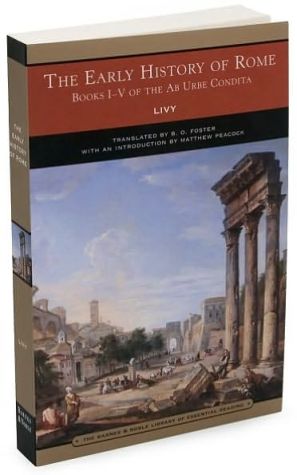

 |

|

The average rating for The Early History of Rome: Books I-V of the Ab Urbe Condita (Barnes & Noble Library of Essential Reading) based on 2 reviews is 4 stars.
Review # 1 was written on 2016-09-21 00:00:00 John Adams John Adams[ naturally this constitutional impasse is resolved through an act of heroism (hide spoiler)] |
Review # 2 was written on 2008-09-03 00:00:00 Frank Gladden Frank GladdenI read the reviews of Livy's History and I see that his writing has been badly misunderstood. Critics make two charges against it; one worthless, and one worthwhile. The first is that Livy is reliant on myth and miraculous stories. He includes tales that are not possibly true, or have been pilfered from the Greeks. They complain also that Livy is too credulous about fantastic occurrences like, for example, when he observes talking cows or phenomenal weather. But this charge is frankly stupid. It is preposterous to expect of ancient historians sensibilities that are modern. And, in any case, it presumes to judge what is the method best equipped for recounting a political story. This entry then will waste no more time answering charges of this sort. They do not deserve the dignity of a reply, let alone a serious one. There is however a second criticism of Livy, one that must be answered. It says that Livy's History is flat; it is shaped to read as "And then... And then... And then...", one consul after another, and has no arc or great complication that it builds to. Livy, they say, is giving epic history, but without epic form. And by that reason his History is boring. It is tedious and dull, and at times almost admittedly so--when, for example, Livy emphasizes "once again" the Aequians and the Volscians are pillaging the Roman hinterland, since such, like his History, are routine in pattern. This criticism is partly right, but mostly wrong. I concede his History is arranged in unepic form, but this is by design, not by accident. And when one reflects upon it, it's usage is actually quite ingenious. If one wants to read the Rise of Rome, you must turn to Polybius. This is where Rome's rise as such is given in the classic history. Not however with Livy. His is the History of the Republic of Rome. They are different--the Rise and the Republic. And where the first might require epic arrangement, the second does not. Instead Livy has organized his narrative as a montage. The origin and life of Romulus, for example, is really a collection of unrelated accounts, but each to a purpose. First there is the story of Romulus's and Remus's adolescence; then their revenge against a wicked king; then the foundation of Rome and Remus's death; then a comparison between Hercules and Romulus; then the abduction of Sabine women; then the betrayal of a Roman fort by Tarpeius's daughter; then the intervention of Sabine women; and finally Romulus's strange disappearance. The narrative here does not aggregate into something larger. Though it progresses with time, each is a story of its own, adjoined only by the coincidence of their Roman association. This technique of story-making is distinctive. And readers may be wrongly expecting from Livy qualities of the larger Roman genre of history that is dominated by the Polybian style. In Tacitus, in Gibbon--there you see the epic form of history told. The question then should not be why Livy went wrong in his recount. That question, I have just argued, is a misapprehension of his History. Instead the question should be what motive Livy had to write the way that he did? Why the anti-epic? Was it a repudiation of Caesarian politics? Was Livy nostalgic for the Republic? Was it that he wanted to designify the great moments in their relation to the little? Did he want to elevate the ordinary travails of republican life to the level of the extra-ordinary? Or was his meaning purely moral? And does the History figure then only as a stage on which to portray the famous life lessons of Roman virtue? These are questions to which I have not the answer. But they are questions that are fair to ask. And those who wait for Livy to ascend to lofty themes rather than attend to the small, will have had an experience similar to having heard something without listening to it. |
CAN'T FIND WHAT YOU'RE LOOKING FOR? CLICK HERE!!!